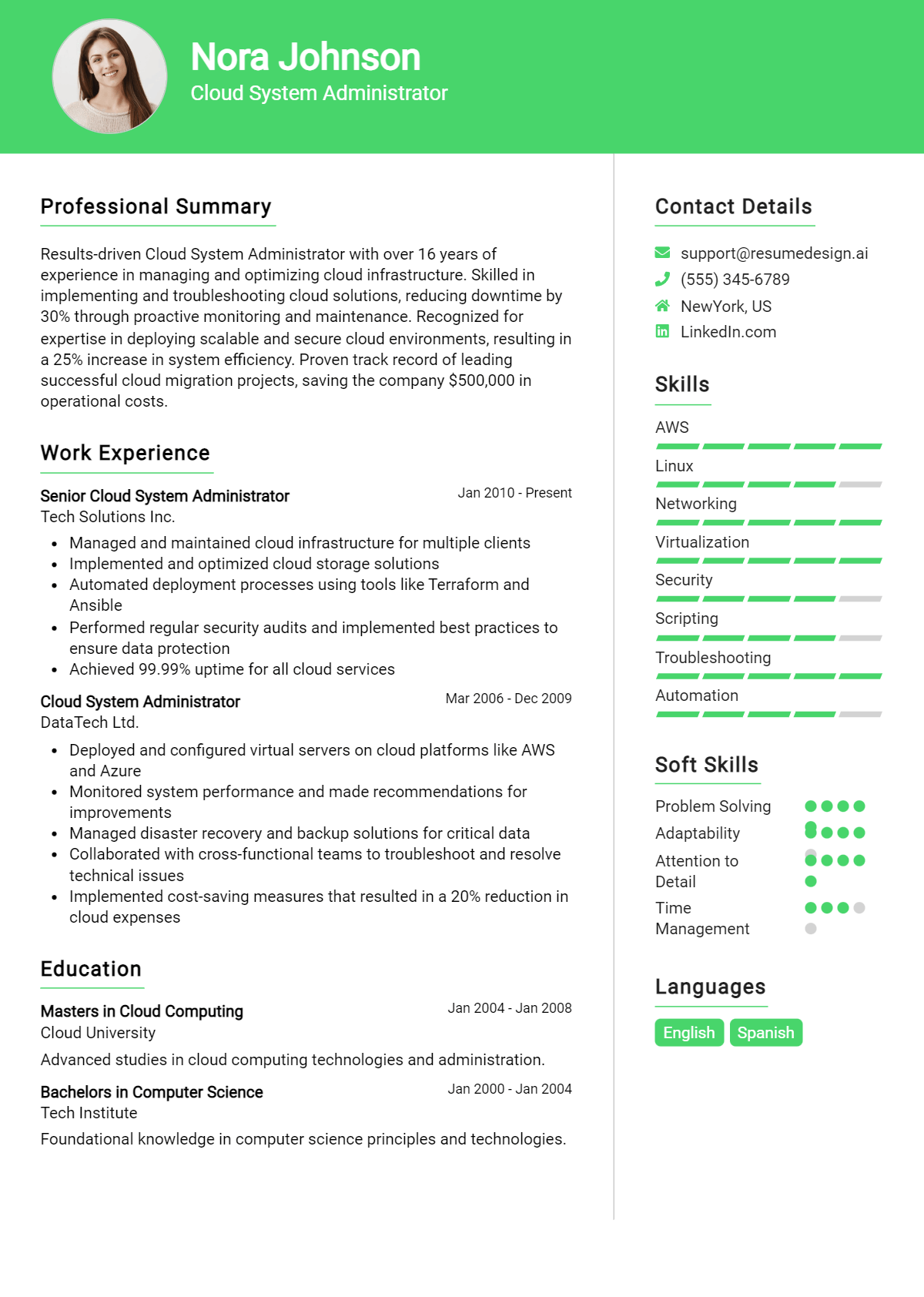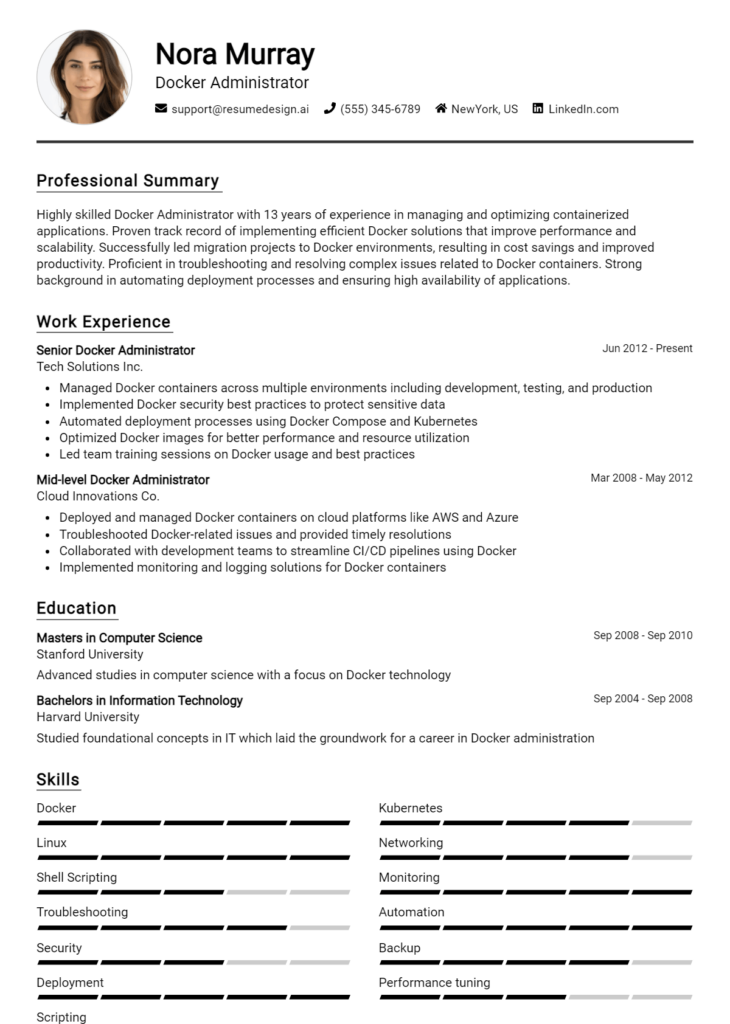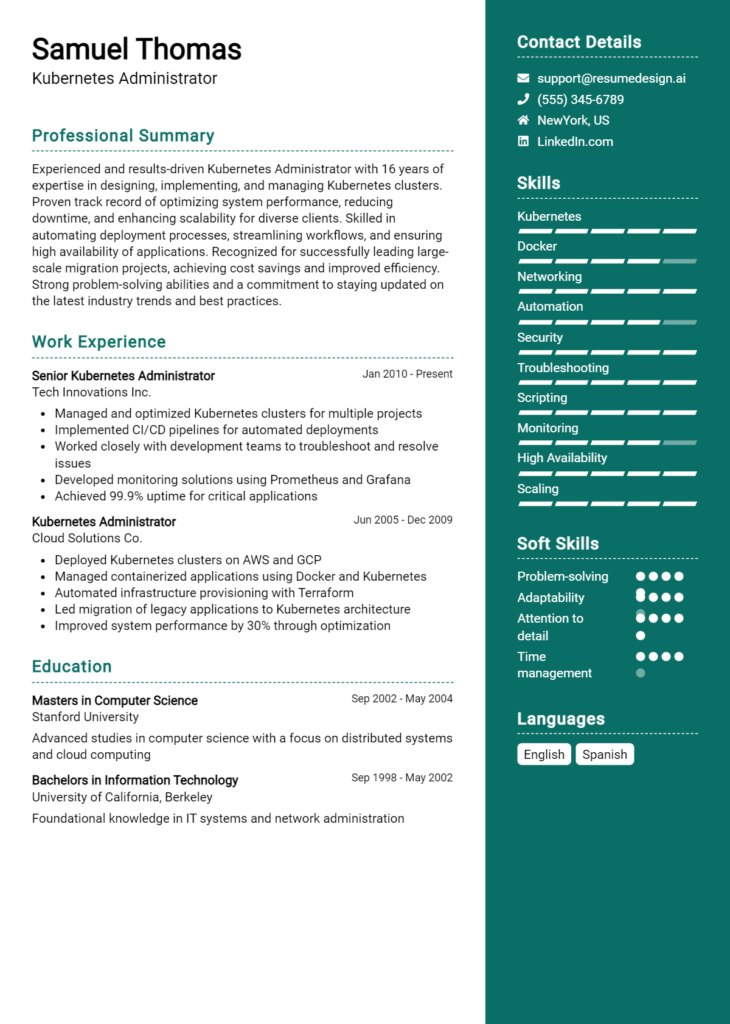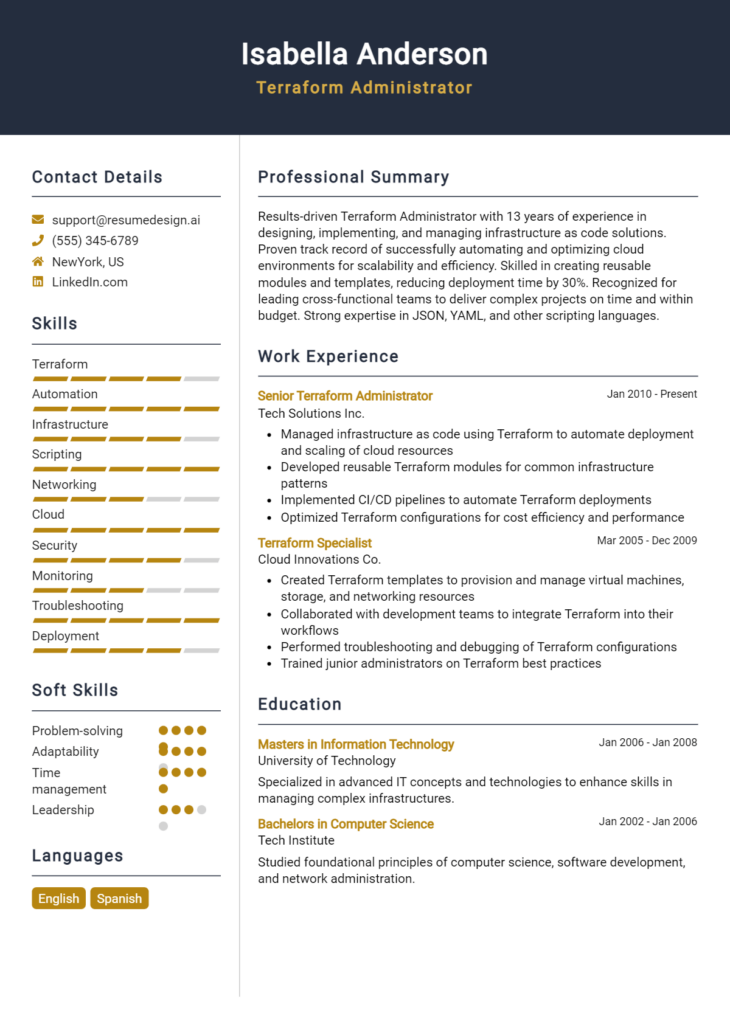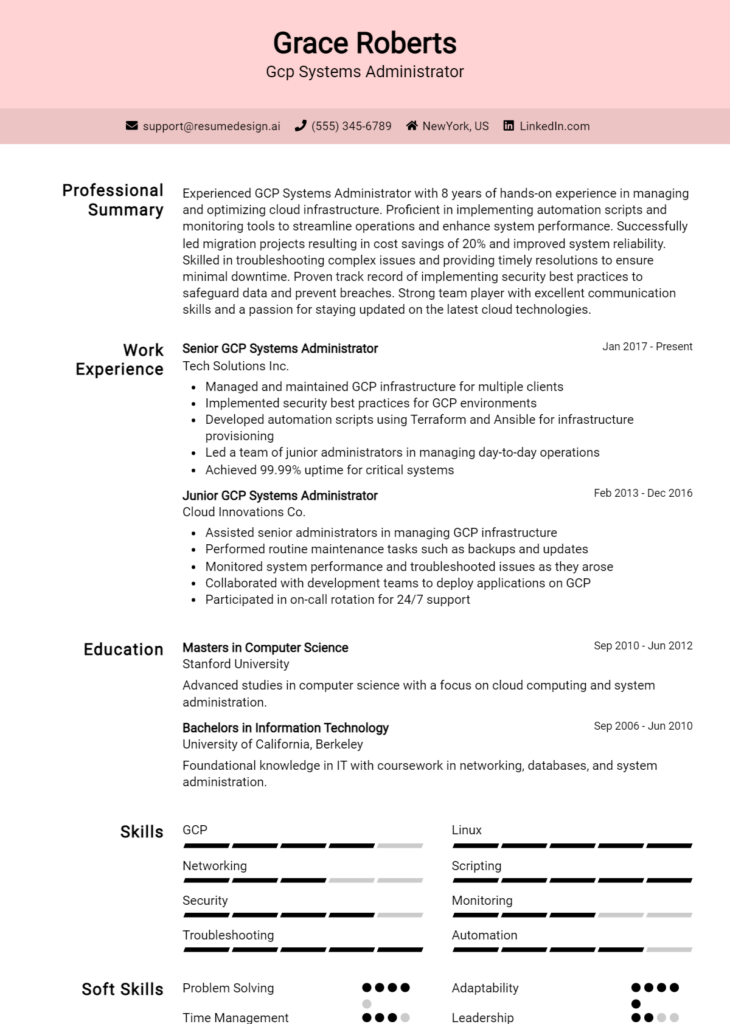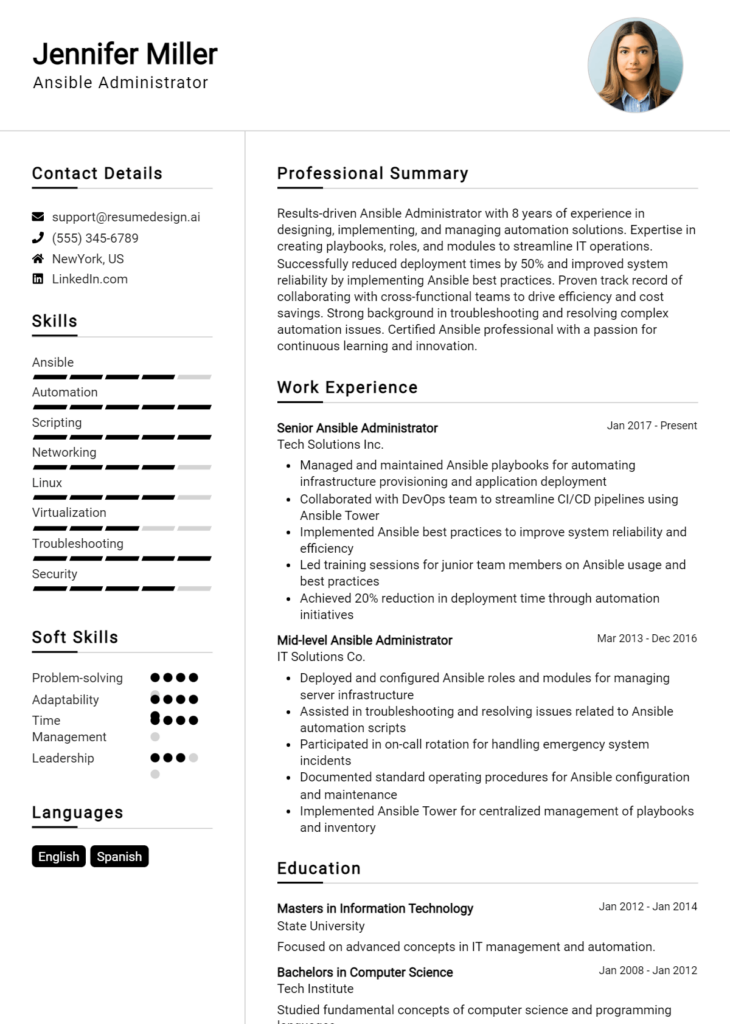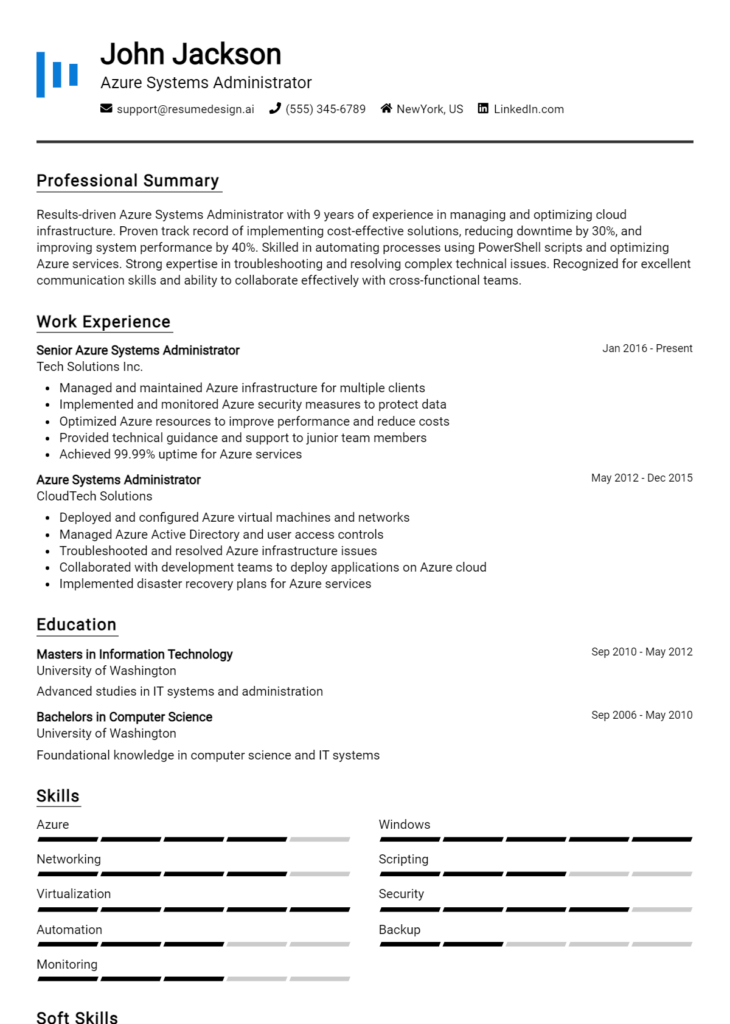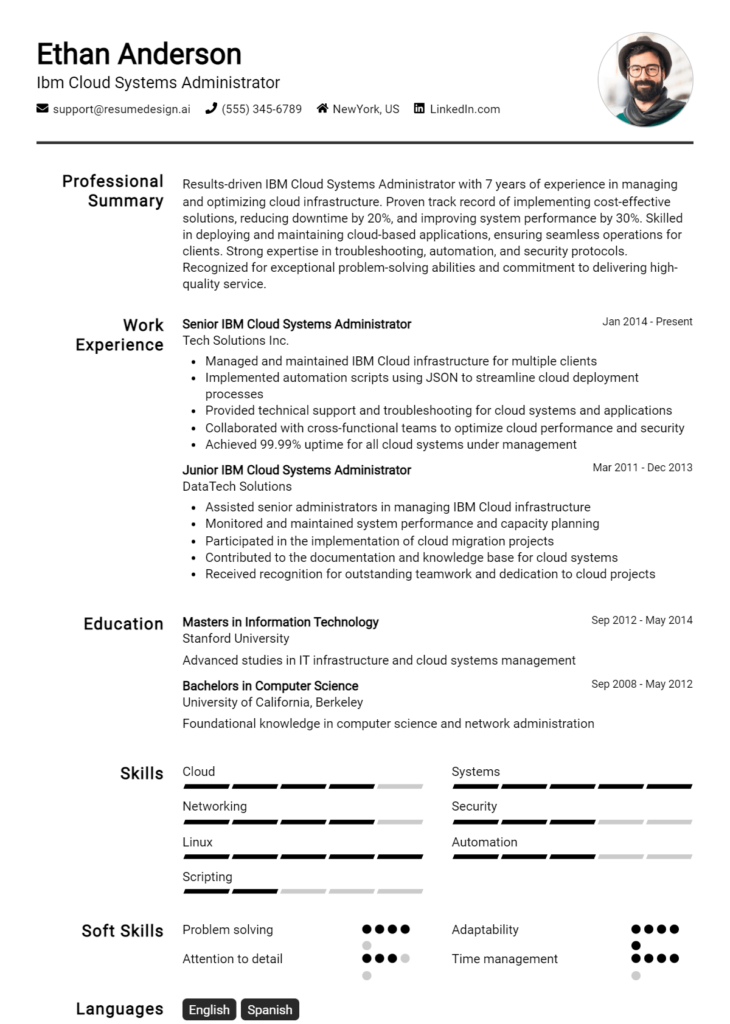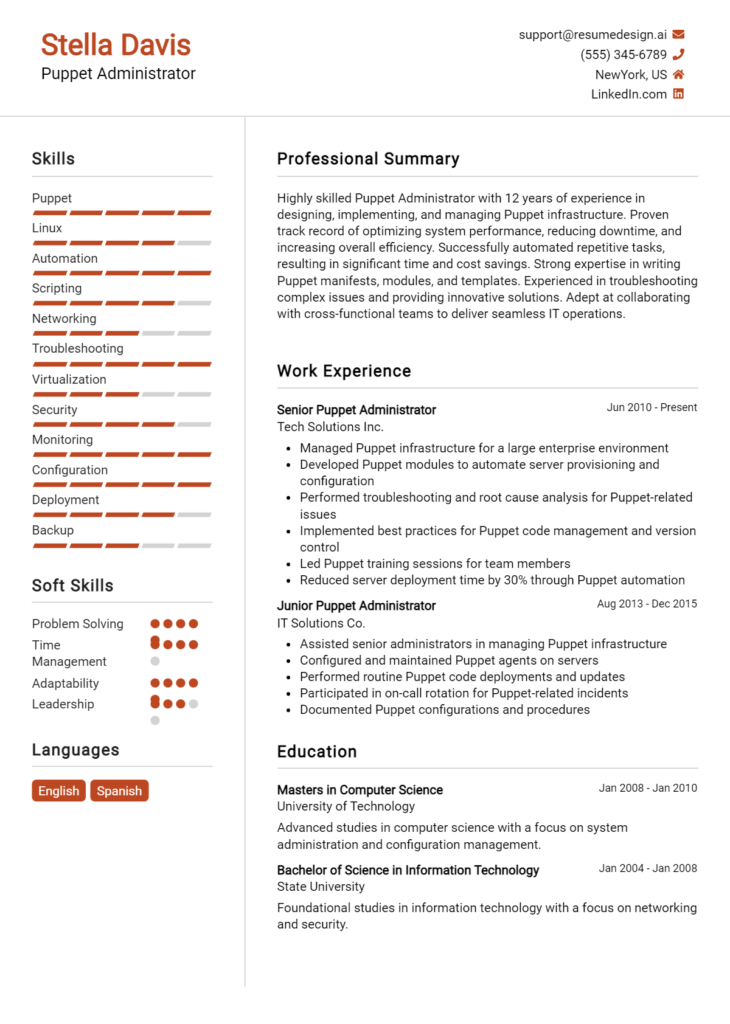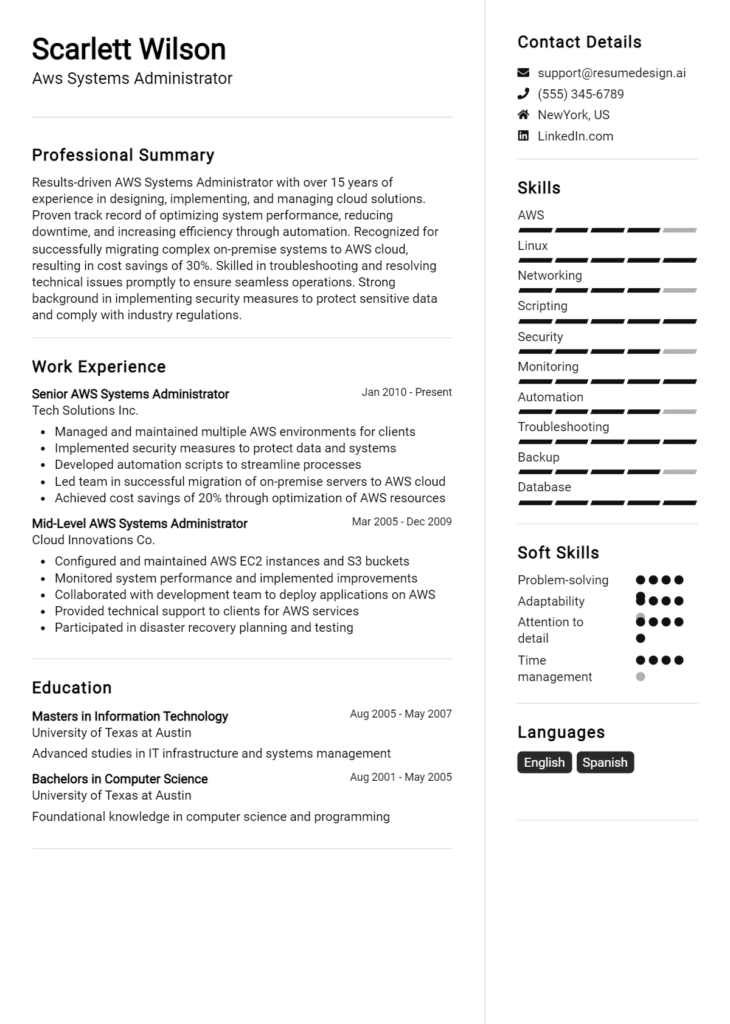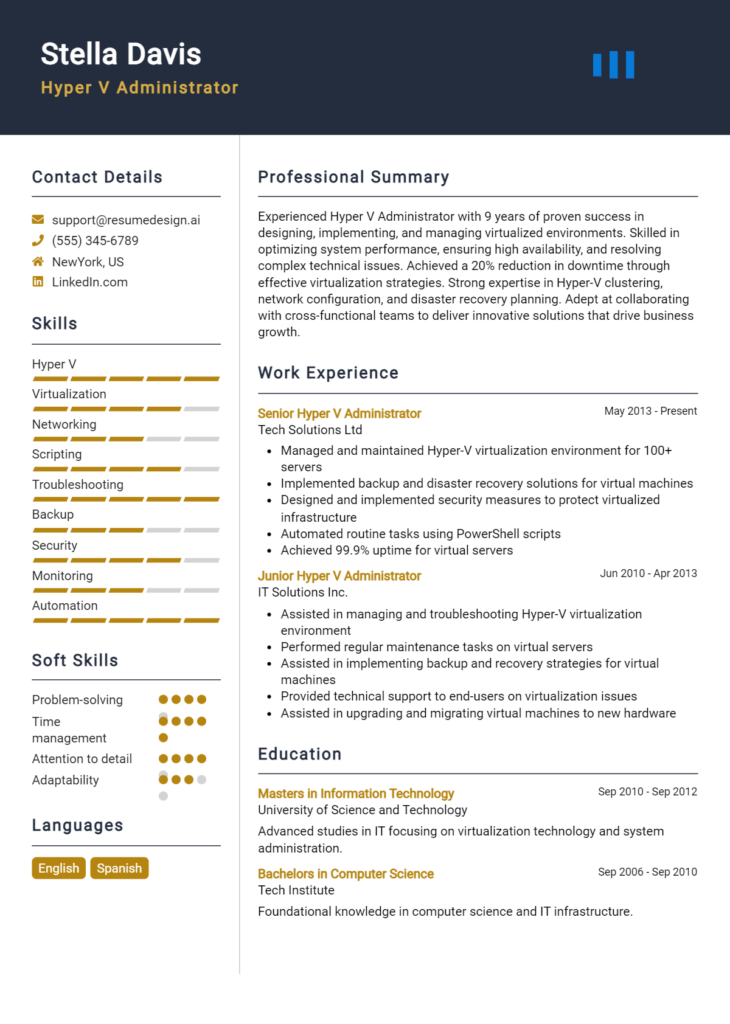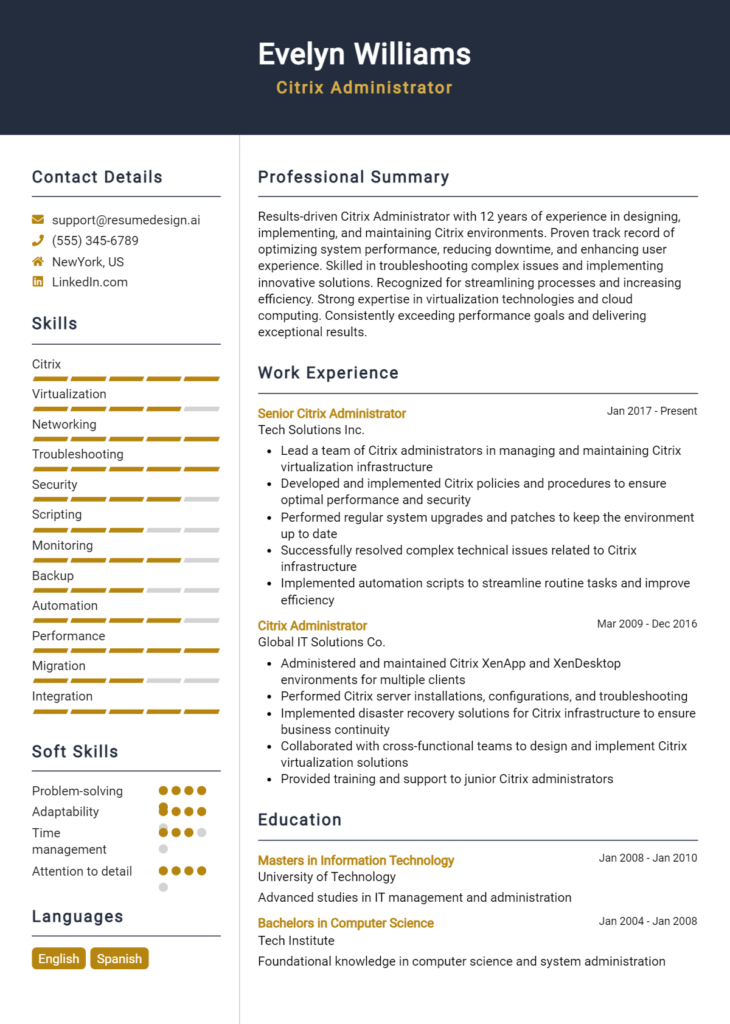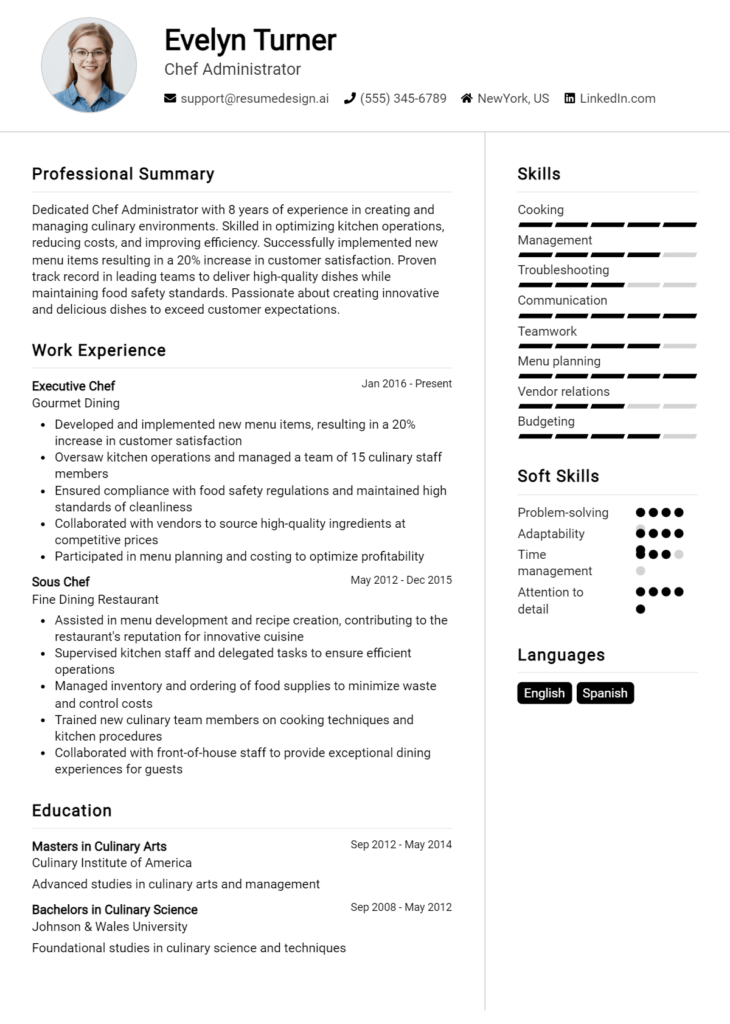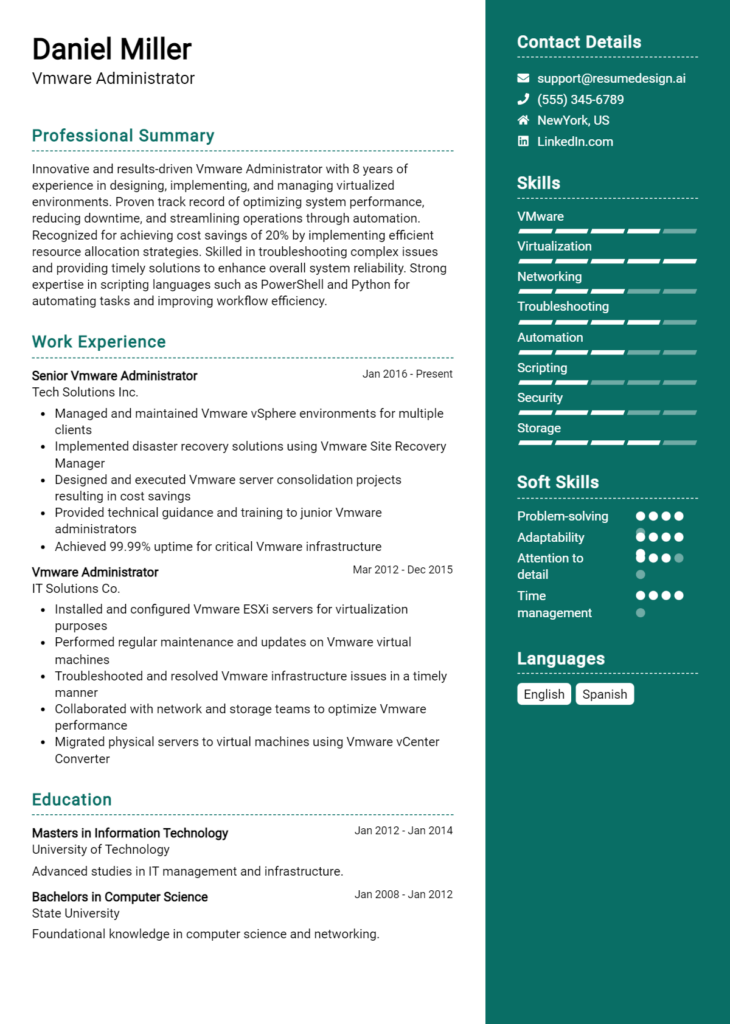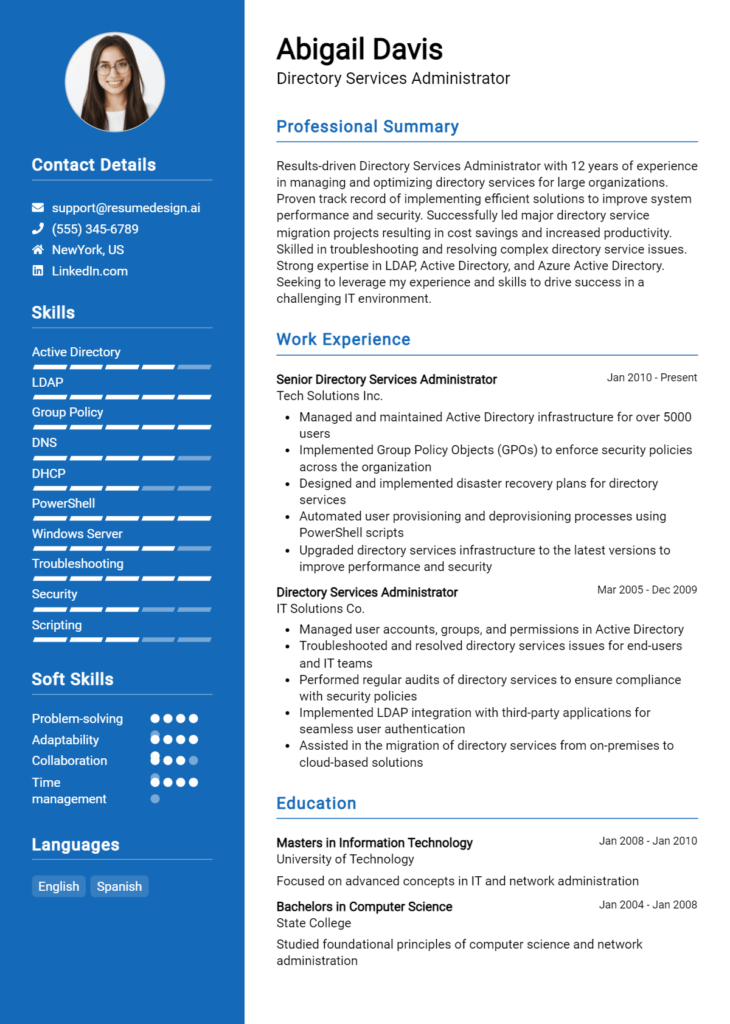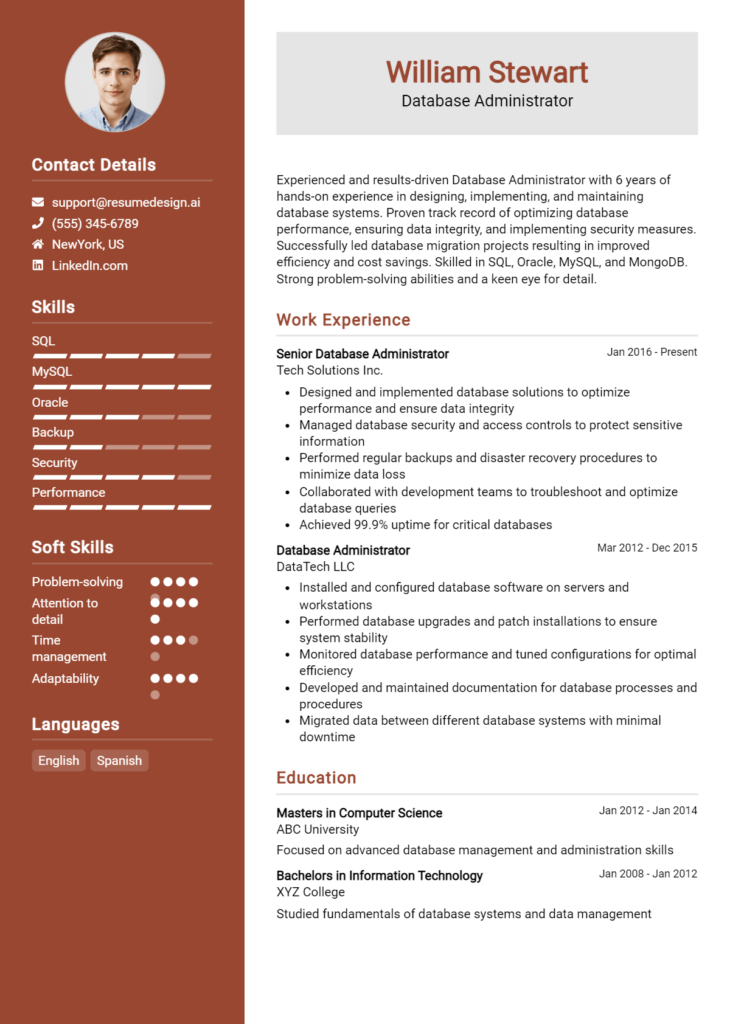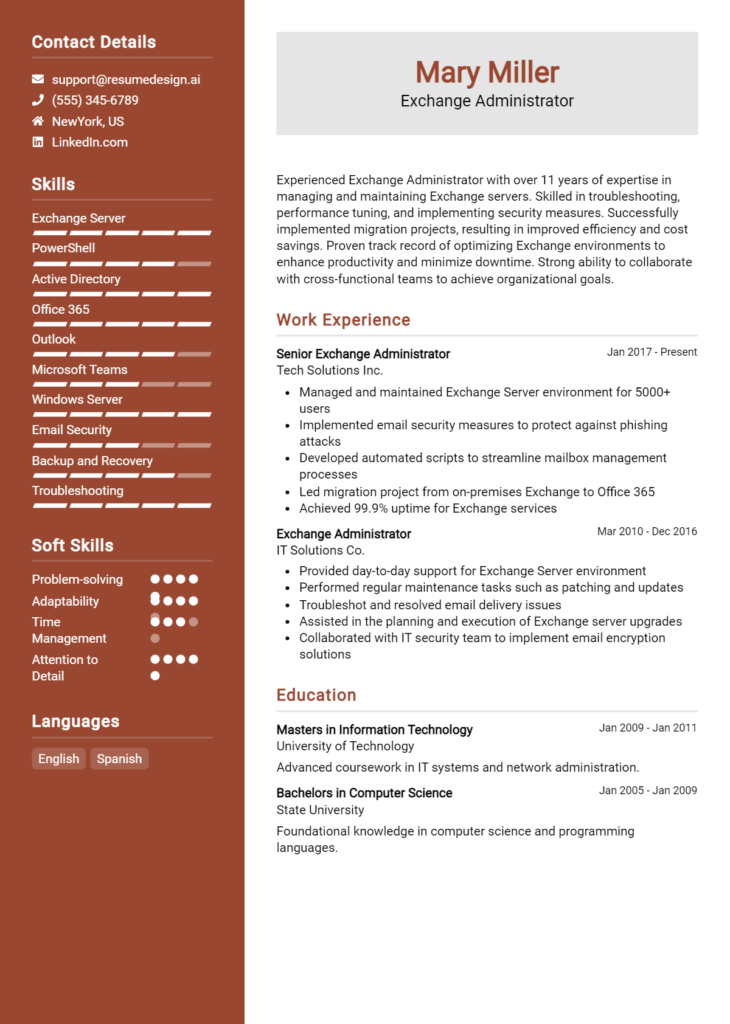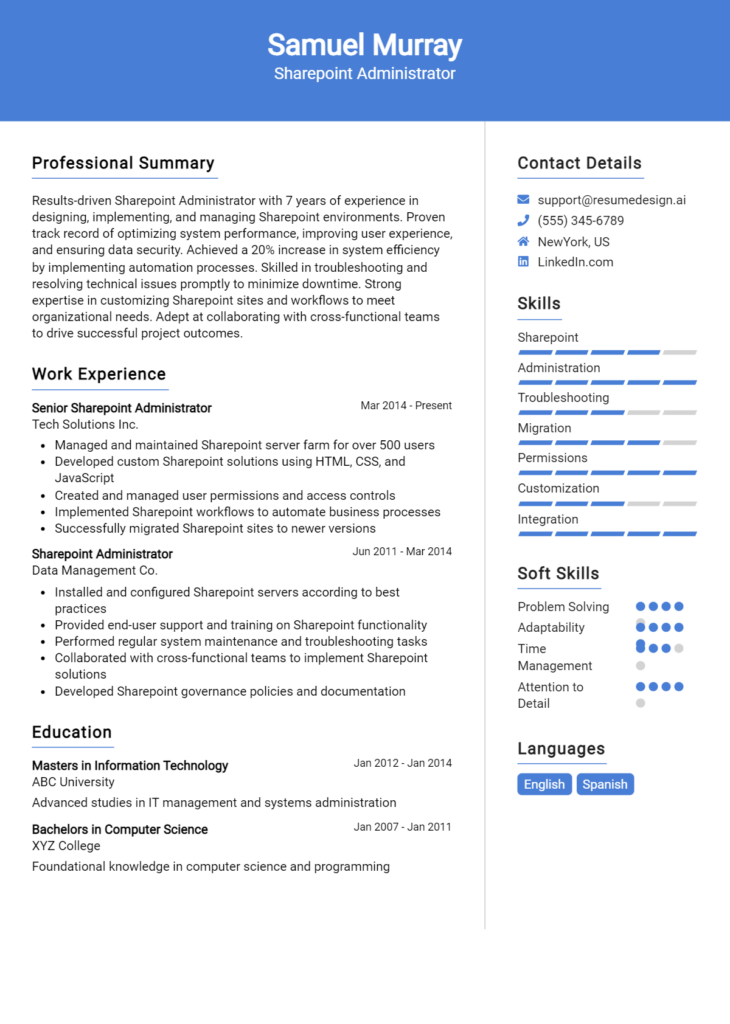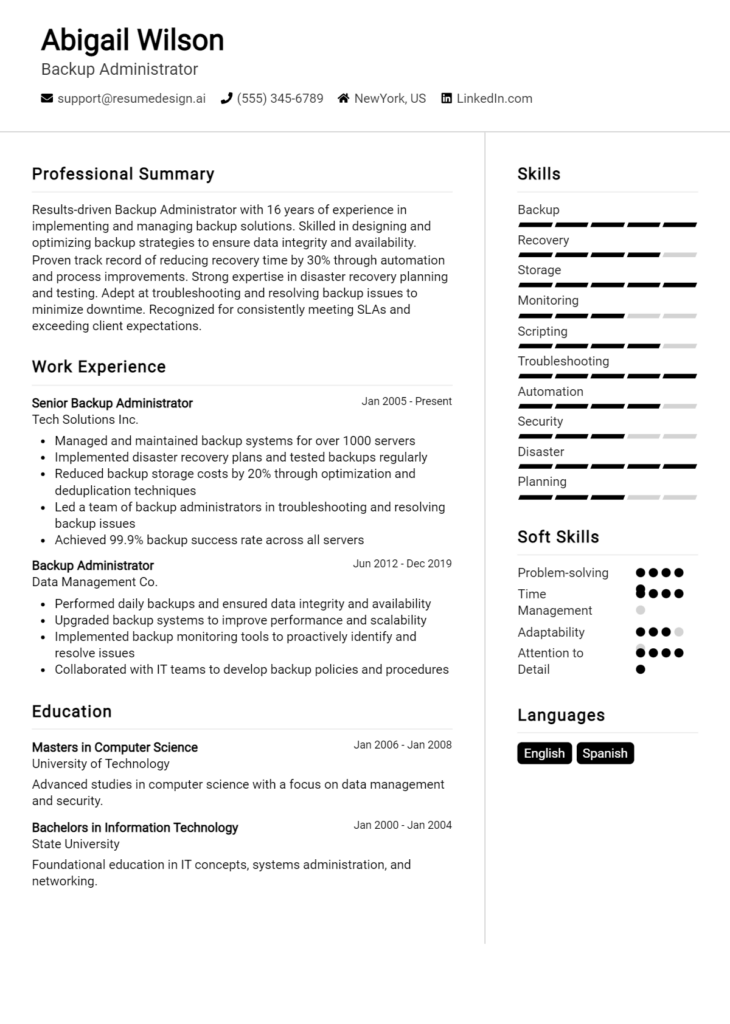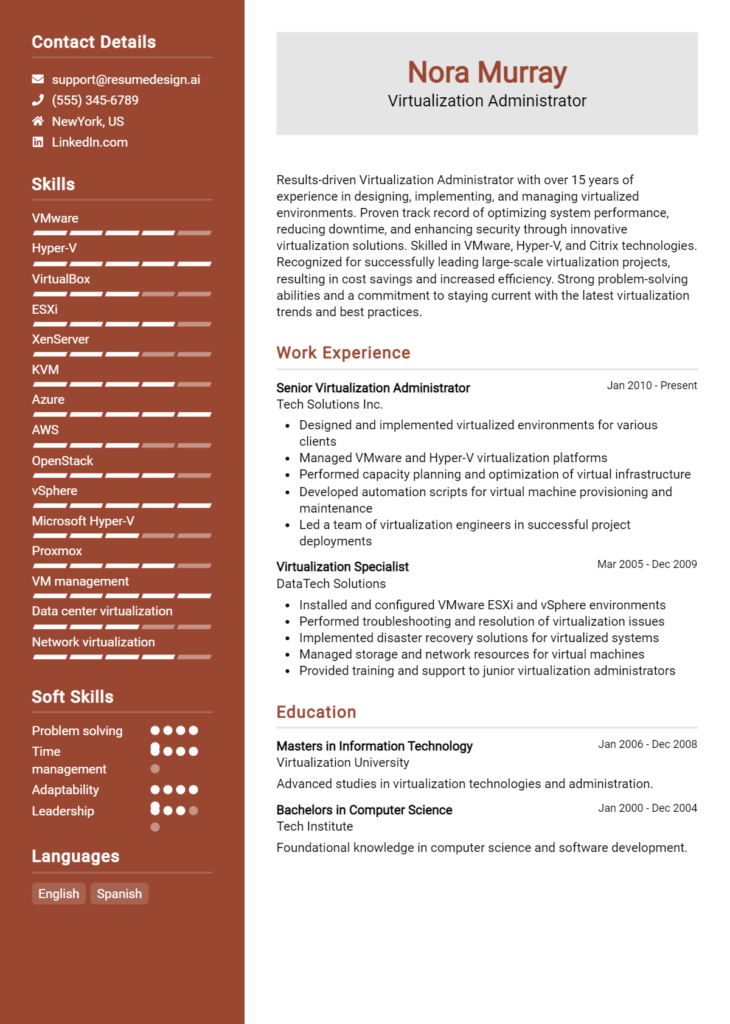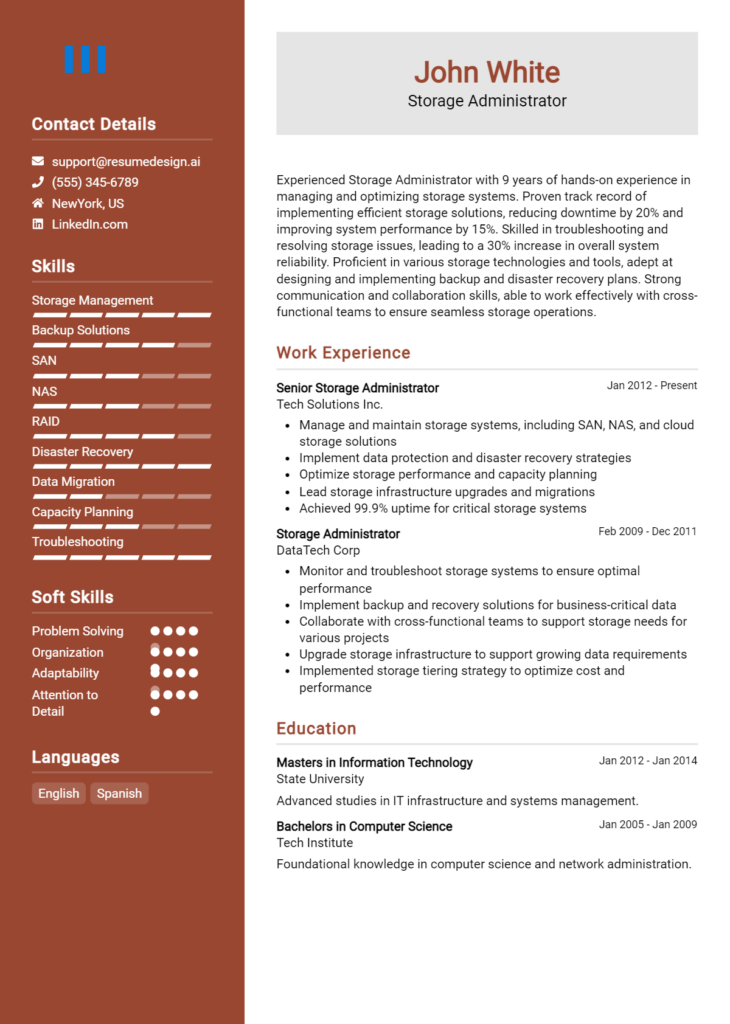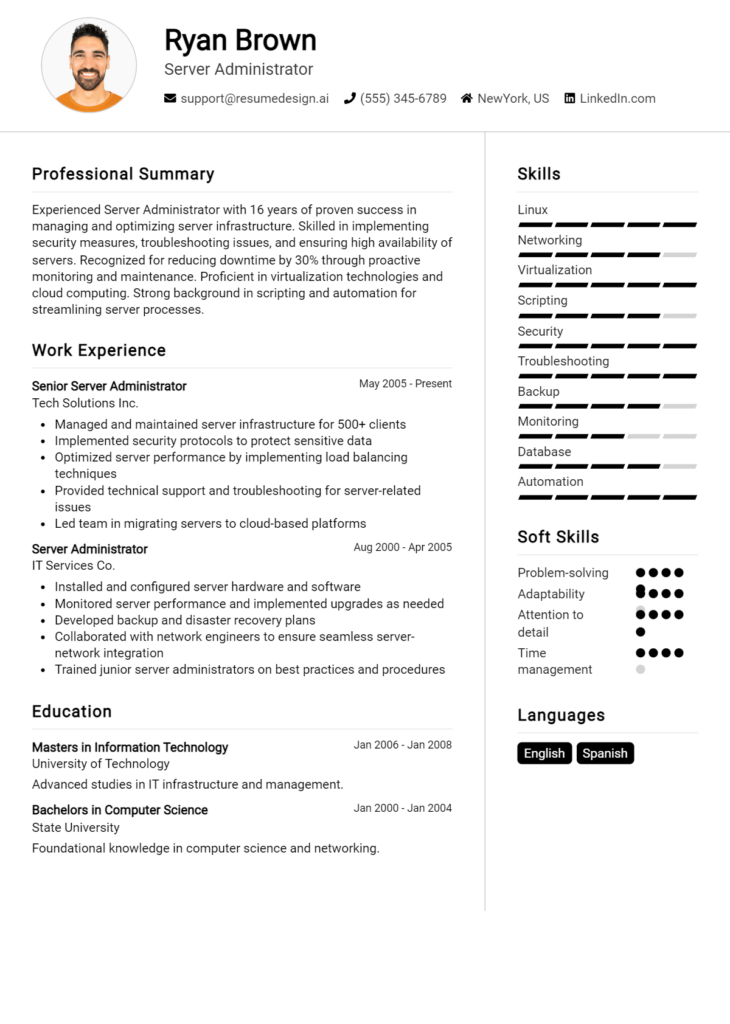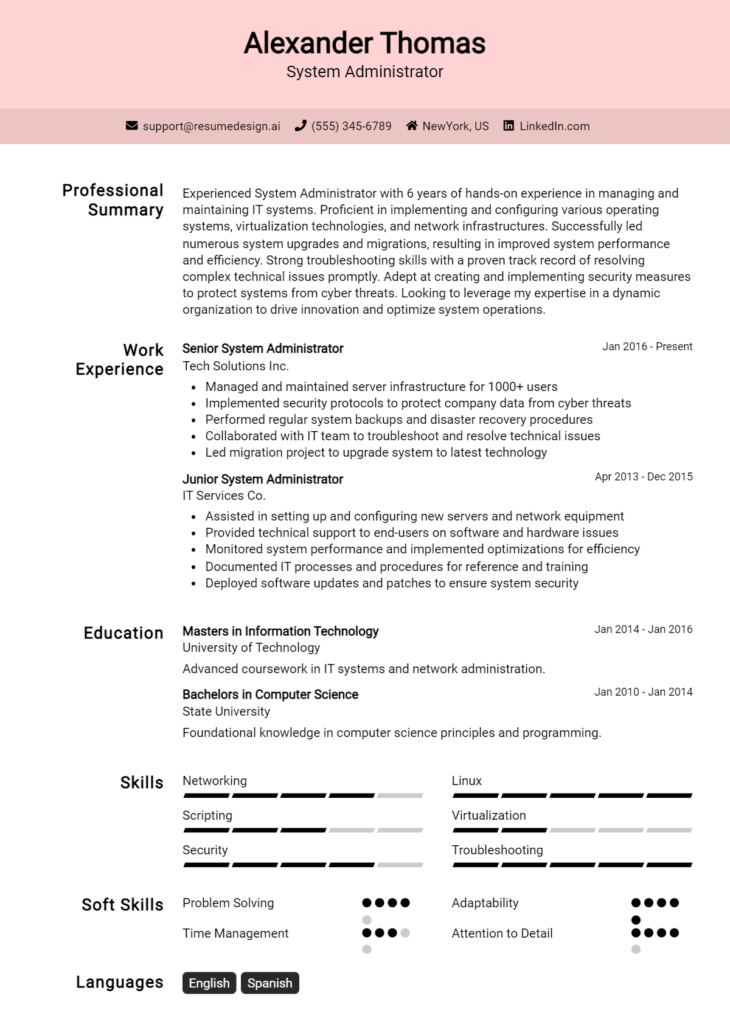Cloud System Administrator Core Responsibilities
A Cloud System Administrator is pivotal in managing and optimizing cloud infrastructure, ensuring seamless collaboration across IT, development, and operational teams. Key responsibilities include monitoring system performance, implementing security protocols, and troubleshooting issues. Essential skills encompass technical expertise in cloud platforms, operational efficiency, and strong problem-solving capabilities. These skills not only aid in maintaining system integrity but also align with organizational goals. A well-structured resume effectively highlights these qualifications, showcasing the candidate’s ability to bridge departmental functions.
Common Responsibilities Listed on Cloud System Administrator Resume
- Manage and monitor cloud infrastructure and services.
- Implement and maintain security protocols and best practices.
- Optimize cloud resource usage and cost management.
- Troubleshoot and resolve cloud-related issues promptly.
- Collaborate with development teams to support cloud application deployment.
- Conduct regular system performance assessments and capacity planning.
- Document processes and procedures for cloud management.
- Ensure compliance with industry regulations and standards.
- Automate repetitive tasks using scripts and cloud management tools.
- Provide technical support and training to staff on cloud-related technologies.
- Evaluate and recommend new cloud technologies and services.
High-Level Resume Tips for Cloud System Administrator Professionals
In the competitive landscape of cloud computing, a well-crafted resume is paramount for Cloud System Administrator professionals. Your resume serves as the first impression you make on a potential employer, acting as your personal marketing tool that highlights not just your skills, but also your achievements and contributions to past roles. It needs to effectively communicate your technical expertise and problem-solving abilities in the cloud domain while also reflecting your understanding of industry best practices. This guide will provide practical and actionable resume tips specifically tailored for Cloud System Administrator professionals, ensuring you stand out in a crowded job market.
Top Resume Tips for Cloud System Administrator Professionals
- Tailor your resume to the job description by incorporating relevant keywords and phrases that align with the specific requirements of the position.
- Highlight your experience with cloud platforms such as AWS, Azure, or Google Cloud, detailing your roles and responsibilities in each instance.
- Quantify your achievements by including metrics, such as percentage improvements in system performance or cost reductions achieved through your initiatives.
- Showcase your certifications (e.g., AWS Certified Solutions Architect, Microsoft Certified: Azure Administrator) to demonstrate your commitment to professional development.
- Include specific projects you’ve worked on that illustrate your problem-solving skills and technical knowledge in cloud infrastructure management.
- Highlight your experience with automation tools and scripting languages, as these are critical skills for modern Cloud System Administrators.
- Demonstrate your capacity for collaboration by mentioning experience working with cross-functional teams, especially in agile environments.
- Emphasize your understanding of security protocols and compliance requirements relevant to cloud environments.
- Keep the format clean and professional, using bullet points for easy readability and ensuring consistent font and spacing throughout.
- Use a summary statement at the top of your resume to provide a concise overview of your skills and career objectives relevant to cloud administration.
By implementing these resume tips, you can significantly enhance your chances of landing a job in the Cloud System Administrator field. A targeted and well-crafted resume not only highlights your qualifications but also demonstrates your proactive approach and attention to detail, qualities that are highly valued by employers in this fast-evolving industry.
Why Resume Headlines & Titles are Important for Cloud System Administrator
In the competitive field of cloud computing, the role of a Cloud System Administrator is crucial for managing and maintaining cloud environments efficiently. A well-crafted resume headline or title serves as the first impression for hiring managers, encapsulating a candidate's key qualifications in a succinct phrase. This brief yet impactful statement can grab attention quickly, making it essential for applicants to highlight their most relevant skills and experiences. A strong headline should be concise, relevant, and tailored specifically to the job being applied for, ensuring that it resonates with the expectations of potential employers.
Best Practices for Crafting Resume Headlines for Cloud System Administrator
- Keep it concise: Aim for one to two lines that summarize your qualifications.
- Be role-specific: Use terminology and keywords relevant to the Cloud System Administrator position.
- Highlight key skills: Identify and mention your most important technical and soft skills.
- Include years of experience: If applicable, incorporate the number of years you have worked in cloud administration.
- Showcase certifications: Mention any relevant certifications that boost your credibility.
- Avoid clichéd phrases: Steer clear of overused terms that can dilute your message.
- Make it action-oriented: Use dynamic language that conveys your proactive approach.
- Tailor for each application: Customize your headline for each job to align with specific requirements.
Example Resume Headlines for Cloud System Administrator
Strong Resume Headlines
Cloud System Administrator with 7+ Years of Experience in AWS and Azure Management
Certified Cloud Practitioner Specializing in Infrastructure Security and Automation
Results-Driven Cloud System Administrator with Proven Success in Scaling Cloud Solutions
Experienced Cloud Administrator with Expertise in Multi-Cloud Environments and DevOps Practices
Weak Resume Headlines
Cloud Administrator Looking for New Opportunities
IT Professional with Cloud Experience
Seeking Cloud System Administrator Position
The strong headlines are effective because they provide specific information about the candidate's skills, experience, and accomplishments, making a compelling case for their suitability for the role. They use action-oriented language and relevant keywords that align with the job description, which helps in capturing the attention of hiring managers. In contrast, the weak headlines fail to impress because they lack specificity and clarity, offering no unique insights into the candidate's qualifications. They come across as generic and can easily be overlooked in a competitive job market.
Writing an Exceptional Cloud System Administrator Resume Summary
A well-crafted resume summary is crucial for a Cloud System Administrator, as it serves as the first impression for hiring managers within the competitive tech landscape. A compelling summary succinctly highlights the candidate's key skills, relevant experience, and notable accomplishments, quickly capturing the attention of employers. In today's fast-paced job market, where hiring managers sift through countless resumes, a strong summary can differentiate a candidate by presenting a clear snapshot of their qualifications and potential value to the organization. It should be concise, impactful, and specifically tailored to align with the job description to maximize its effectiveness.
Best Practices for Writing a Cloud System Administrator Resume Summary
- Quantify Achievements: Use numbers and metrics to demonstrate your impact, such as system uptime percentages or cost savings.
- Focus on Relevant Skills: Highlight key technical skills that are directly related to cloud systems, such as AWS, Azure, or virtualization technologies.
- Tailor the Summary: Customize your summary for each job application to reflect the specific requirements and keywords found in the job description.
- Use Action Verbs: Start sentences with strong action verbs to convey confidence and decisiveness.
- Keep it Concise: Aim for 3-5 sentences that summarize your qualifications without being overly verbose.
- Showcase Certifications: Mention relevant certifications (e.g., AWS Certified Solutions Architect) to enhance credibility.
- Highlight Team Collaboration: Emphasize your ability to work within cross-functional teams, showcasing communication and collaborative skills.
- Reflect on Problem-Solving Skills: Briefly mention your ability to troubleshoot complex issues and provide efficient solutions.
Example Cloud System Administrator Resume Summaries
Strong Resume Summaries
Cloud System Administrator with over 7 years of experience in managing and optimizing cloud infrastructures. Achieved a 99.9% system uptime across multiple AWS environments, resulting in a 20% decrease in operational costs. Proficient in deploying and maintaining scalable solutions using Terraform and Kubernetes.
Results-driven Cloud System Administrator with expertise in Azure and Google Cloud Platform, delivering 30% faster deployment times through improved CI/CD pipelines. Successfully led a team to migrate legacy applications to the cloud, enhancing performance and security while reducing costs by 15%.
Detail-oriented Cloud System Administrator with 5+ years of experience in cloud architecture and system automation. Increased system efficiency by implementing automated monitoring tools, resulting in a 25% reduction in downtime. Holds AWS Certified Solutions Architect certification.
Weak Resume Summaries
Experienced IT professional looking for a Cloud System Administrator position. I have worked with various technologies and have a lot of skills.
Cloud System Administrator with some experience in cloud services. I am a team player and can adapt to new situations quickly.
The strong resume summaries stand out due to their specificity, quantifiable achievements, and relevant skills that directly relate to the Cloud System Administrator role. They provide clear evidence of the candidate's capabilities and accomplishments, making them compelling to hiring managers. In contrast, the weak summaries lack detail and fail to convey the candidates' qualifications effectively. They are vague and generic, which diminishes their impact and makes it difficult for hiring managers to gauge the candidates' true potential.
Work Experience Section for Cloud System Administrator Resume
The work experience section of a Cloud System Administrator resume is critical, as it serves as the primary showcase of a candidate’s technical expertise, leadership capabilities, and ability to deliver high-quality solutions in a cloud environment. This section not only highlights specific skills related to cloud technologies, systems management, and security but also demonstrates how candidates have successfully managed teams and projects to achieve significant outcomes. By quantifying achievements and aligning past experiences with industry standards and best practices, candidates can effectively illustrate their value to potential employers, making this section a focal point of the resume.
Best Practices for Cloud System Administrator Work Experience
- Detail specific cloud platforms and technologies you have worked with (e.g., AWS, Azure, Google Cloud).
- Quantify your achievements, such as percentage improvements in system uptime or cost savings achieved through optimization.
- Highlight leadership roles and teamwork experiences that demonstrate your ability to manage cross-functional teams.
- Use action verbs and concise language to communicate your contributions clearly and effectively.
- Include relevant certifications and technical skills that align with the role.
- Tailor your experience to match the job description and key requirements of the position you are applying for.
- Showcase your problem-solving abilities and adaptability in dynamic cloud environments.
- Provide context for your experiences by mentioning the scale of projects or the size of the teams you worked with.
Example Work Experiences for Cloud System Administrator
Strong Experiences
- Led a team of 5 in migrating 150+ on-premise applications to AWS, resulting in a 40% reduction in operational costs and a 99.9% uptime.
- Implemented a cloud security protocol that decreased security incidents by 60% over a 12-month period, enhancing overall system integrity.
- Managed a cross-functional team to automate deployment processes using CI/CD tools, reducing deployment time by 70% and improving team productivity.
- Designed and executed a disaster recovery plan that improved recovery time objectives (RTO) by 50%, ensuring business continuity during outages.
Weak Experiences
- Worked on cloud-related tasks in various projects.
- Assisted with some cloud migrations without specifying the number or type of applications involved.
- Helped maintain cloud systems, but did not detail specific responsibilities or outcomes.
- Participated in team meetings about cloud strategies with no mention of personal contributions or results achieved.
The examples provided illustrate the distinction between strong and weak experiences. Strong experiences are specific, quantifiable, and highlight leadership and collaboration, allowing potential employers to see the candidate's direct impact on projects and teams. In contrast, weak experiences lack detail and measurable outcomes, making it difficult for employers to assess the candidate's contributions or expertise in cloud systems administration.
Education and Certifications Section for Cloud System Administrator Resume
The education and certifications section of a Cloud System Administrator resume is crucial as it serves as a testament to the candidate's academic foundation and commitment to the field. This section effectively showcases the candidate's relevant educational background, industry-recognized certifications, and ongoing learning efforts, all of which are essential for staying current in the rapidly evolving cloud technology landscape. By providing details on relevant coursework, certifications, and specialized training, candidates can significantly enhance their credibility and demonstrate their alignment with the job role, making them more appealing to potential employers.
Best Practices for Cloud System Administrator Education and Certifications
- Prioritize relevant certifications such as AWS Certified Solutions Architect, Microsoft Certified: Azure Administrator Associate, or CompTIA Cloud+.
- Include degrees in computer science, information technology, or related fields to establish a solid educational foundation.
- List any specialized training or workshops that focus on cloud technologies and system administration.
- Be specific about coursework that directly relates to cloud systems, networking, and security.
- Highlight advanced certifications or credentials that are respected in the industry to boost credibility.
- Keep the section updated with the latest certifications to reflect continuous professional development.
- Use clear formatting to enhance readability and ensure that critical information stands out.
- Consider including relevant online courses or training programs that demonstrate adaptability to new technologies.
Example Education and Certifications for Cloud System Administrator
Strong Examples
- Bachelor of Science in Information Technology, University of Technology, 2021
- AWS Certified Solutions Architect – Associate, 2023
- Microsoft Certified: Azure Administrator Associate, 2022
- Coursework in Cloud Computing, Network Security, and Virtualization Techniques
Weak Examples
- Associate of Arts in General Studies, Community College, 2019
- Outdated Cisco Certified Network Associate (CCNA) from 2015
- Certificate in Basic Computer Skills, 2020
- High School Diploma, 2018
The examples listed as strong demonstrate a clear alignment with the Cloud System Administrator role, showcasing relevant degrees and current certifications that are in high demand within the industry. These credentials reflect the candidate's preparation and commitment to the field. In contrast, the weak examples indicate a lack of relevance to cloud systems and a failure to keep up with industry standards. Outdated certifications and unrelated degrees do not contribute to the candidate's qualifications for the role, making them less competitive in the job market.
Top Skills & Keywords for Cloud System Administrator Resume
As the role of a Cloud System Administrator continues to evolve with the rapid advancement of technology, showcasing the right skills on your resume becomes paramount. Employers are not only looking for technical expertise but also for individuals who possess a well-rounded skill set that can navigate the complexities of cloud environments. A well-crafted resume highlights both hard and soft skills, demonstrating your ability to manage cloud infrastructure, troubleshoot issues, and communicate effectively with team members and stakeholders. By emphasizing these skills, you can significantly enhance your chances of standing out in a competitive job market. For more insights on how to present your skills effectively, consider exploring this skills resource.
Top Hard & Soft Skills for Cloud System Administrator
Soft Skills
- Effective Communication
- Problem Solving
- Team Collaboration
- Adaptability
- Critical Thinking
- Time Management
- Attention to Detail
- Customer Service Orientation
- Initiative
- Conflict Resolution
Hard Skills
- Cloud Platform Management (AWS, Azure, Google Cloud)
- Virtualization Technologies (VMware, Hyper-V)
- Networking Concepts (TCP/IP, DNS, VPN)
- Scripting Languages (Python, Bash, PowerShell)
- Configuration Management Tools (Ansible, Puppet, Chef)
- Database Management (SQL, NoSQL)
- Security Best Practices and Compliance
- Backup and Disaster Recovery Planning
- Monitoring Tools (Nagios, CloudWatch)
- Containerization (Docker, Kubernetes)
By focusing on these essential skills, you can better illustrate your capabilities as a Cloud System Administrator and reinforce your work experience to prospective employers.
Stand Out with a Winning Cloud System Administrator Cover Letter
Dear [Hiring Manager's Name],
I am excited to apply for the Cloud System Administrator position at [Company Name] as advertised on [where you found the job posting]. With a robust background in cloud computing and systems administration, I am confident in my ability to contribute effectively to your team. My experience managing cloud infrastructure, optimizing performance, and ensuring security compliance aligns perfectly with the goals outlined in the job description.
In my previous role at [Your Previous Company], I successfully led the migration of our on-premises systems to a cloud-based infrastructure, resulting in a 30% reduction in operational costs and a 50% improvement in system availability. My hands-on expertise with platforms such as AWS, Azure, and Google Cloud has enabled me to implement best practices in cloud architecture and automation. I am well-versed in using tools like Terraform and Ansible for infrastructure as code, which has allowed me to streamline deployment processes and minimize human error.
Additionally, I possess a strong commitment to continuous learning and staying updated on industry trends and emerging technologies. This dedication has led me to achieve several relevant certifications, including AWS Certified Solutions Architect and Microsoft Certified: Azure Administrator Associate. I believe that my proactive approach to problem-solving and my ability to work collaboratively with cross-functional teams make me a valuable addition to your organization.
I am eager to bring my technical skills and passion for cloud technologies to [Company Name] and contribute to the innovative projects you are undertaking. Thank you for considering my application. I look forward to the opportunity to discuss how my experience and vision align with the needs of your team.
Sincerely,
[Your Name]
[Your Contact Information]
Common Mistakes to Avoid in a Cloud System Administrator Resume
When crafting a resume for a Cloud System Administrator position, it's crucial to present your experience and skills effectively. Many candidates fall into common pitfalls that can undermine their chances of making a strong impression. Avoiding these mistakes can significantly enhance your resume's impact and increase your chances of landing an interview. Here are some common mistakes to avoid:
Lack of Specificity: Vague descriptions of past roles can leave hiring managers unsure of your qualifications. Be specific about the technologies you’ve worked with and the projects you’ve completed.
Ignoring Keywords: Failing to include relevant keywords from the job description can cause your resume to be overlooked by Applicant Tracking Systems (ATS). Tailor your resume to each job application by integrating terms and phrases mentioned in the posting.
Overloading Technical Jargon: While technical skills are essential, using excessive jargon can confuse readers. Aim for a balance between technical terms and clear explanations to ensure your resume is easily understood.
Neglecting Soft Skills: Focusing solely on technical capabilities can make your resume one-dimensional. Cloud System Administrators also need strong communication, problem-solving, and teamwork skills, so be sure to highlight these.
Not Quantifying Achievements: Generic statements about your responsibilities do not convey the impact of your work. Use metrics and numbers to quantify your achievements, such as the percentage of uptime you maintained or the size of the cloud infrastructure you managed.
Poor Formatting: An unorganized or cluttered resume can be difficult to read. Use a clean, professional format with clear headings, bullet points, and consistent font styles to enhance readability.
Omitting Certifications and Training: In the cloud domain, certifications can set you apart from other candidates. Ensure you list relevant certifications, such as AWS Certified Solutions Architect or Microsoft Azure Administrator, prominently on your resume.
Not Tailoring for the Audience: Sending out a generic resume for every application can be detrimental. Tailor your resume to align with the specific requirements and culture of each company you apply to, demonstrating your genuine interest and fit for the role.
Conclusion
As a Cloud System Administrator, you play a critical role in managing and maintaining cloud infrastructure, ensuring systems are secure, efficient, and available. Throughout our discussion, we highlighted essential responsibilities, including configuring cloud services, monitoring performance, implementing security protocols, and optimizing costs. Additionally, we explored the importance of staying updated with the latest cloud technologies and best practices to enhance your skill set and career prospects.
In conclusion, it’s vital to ensure that your resume reflects your expertise and accomplishments accurately. Take the time to review your Cloud System Administrator resume and tailor it to showcase your unique qualifications. To assist you in this process, several valuable resources are available:
- Explore a variety of resume templates that can help you structure your information effectively.
- Utilize the resume builder to create a polished and professional-looking resume with ease.
- Check out resume examples to find inspiration and see how others in your field present their experience.
- Don’t forget to craft a compelling cover letter using cover letter templates to accompany your resume.
Take action today and make sure your resume stands out in the competitive job market for Cloud System Administrators!

